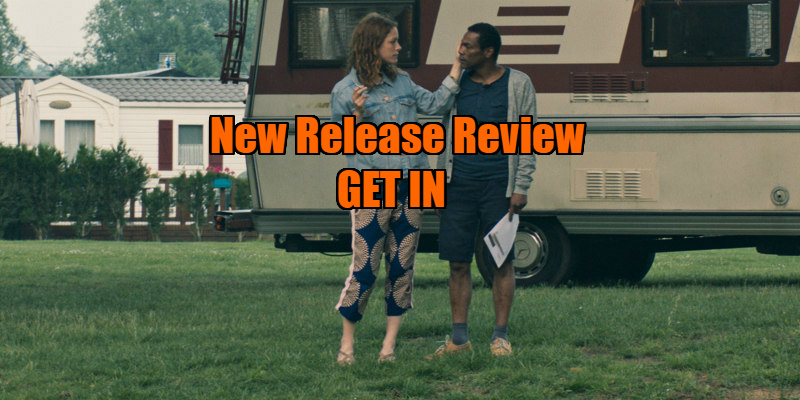
Review by Eric Hillis
Directed by: Olivier Abbou
Starring: Adama Niane, Stéphane Caillard, Paul Hamy, Eddy Leduc, Hubert Delattre

I've learned a lot from watching horror movies over the years. One important lesson is that you should never travel anywhere in a Winnebago. Think of the poor unsuspecting saps of The Hills Have Eyes and Race with the Devil, soft city folk forced to embrace man's animal nature in a battle for survival against more elemental human forces. The protagonist of Olivier Abbou's Get In (originally titled 'Furie' but changed no doubt in an attempt to piggyback on the success of Get Out), Paul Diallo (Adama Niane), is exactly the sort of soft lad who has his masculinity tested in such scenarios, but for Paul, the trouble doesn't begin while on holiday, but rather upon his return to his own home.
Arriving back at his improbably large, gated home with his wife, Chloe (Stéphane Caillard), and young son, Louis (Matthieu Kacou), Paul finds himself locked out of his own driveway. Calls to the cellphone of their childminder - Sabrina (Marie Bourin), whom they lent the house to while they were away for two months - go straight to voicemail, and when they call their home phone they're surprised to find Sabrina and her husband, Eric (Hubert Delattre), have replaced their voicemail message with one of their own. Paul hops over the gate, but unluckily for him, the police arrive on the scene, and seeing a black man shouting on what they believe is someone's else's property, promptly arrest him.

At the police station, the full weight of the situation is explained. As Paul made Sabrina and Eric sign an agreement to pay all the utility bills during their stay, the law states that they are entitled to remain on the property. Paul and Chloe hire a lawyer, but the process drags out, leaving them to pitch their Winnebago in a trailer park for the foreseeable future.
[ READ MORE: New Release Review - Ema ]
The trailer park is maintained by Mickey (Paul Hamy), a sinewy sleazebag who shares some history with Chloe. She tells Paul they were simply in school together, but it's clear there's more to their past than she's letting her naive hubby in on. Like Rob Lowe in Bad Influence or Brad Pitt in Fight Club, Mickey emerges as an example of the trope I like to call the "Homme Fatale", a charismatic, uber-masculine man who befriends a testosterone deficient male protagonist, selling him a neanderthal concept of masculinity - think Jordan Peterson with a six pack. Though initially wary, Paul falls for Mickey's cod-philosophy and begins visiting nightclubs, necking cans and hooking up with women half his age. Fuelled by his new-found "masculinity", Paul decides to take the fight to his squatters, driving his Winnebago through the fence of his stolen home and refusing to move it from his lawn, turning squatters' rights to his own advantage. But as Mickey grows more influential in Paul's life, things head towards a violent conclusion.

The main touchstone for Abbou's film is Sam Peckinpah's Straw Dogs, from which it borrows entire narrative beats. Paul is a descendant on Dustin Hoffman's meek intellectual while Chloe shares elements of his young trophy wife, played by Susan George. As with Hoffman, Paul is taken under the wing of a rough and tumble man who claims to be his buddy but who really despises everything he stands for. Like the figure at the centre of the 1971 movie's infamous rape scene, Mickey is keen on rekindling his past "romance" with Paul's wife. There's a lot of Ted Kotcheff's Australian classic Wake in Fright here too, and that movie's disturbing kangaroo massacre is echoed in a gruesome scene here in which Mickey and his mates introduce Paul to the thrills of shooting wild hogs.
[ READ MORE: New Release Review - Reborn ]
Where Get In forges its own path to a degree is in its racial aspect. A teacher, Paul grows disgruntled one day when a black pupil accuses him of being an "Oreo" (black outside, white inside). While walking through the trailer park late at night, Paul spots an offensively racist garden ornament of a black man with a beaming smile carrying a bunch of bananas. When Mickey spots Paul tossing the offending statuette into a lake, he latches onto Paul's weak spot, his identity crisis. Mickey plays up racist stereotypes of black masculinity, but rather than correcting him the way he might if one of his students came out with such talk, Paul embraces this white man's idea of how a black man should behave.

The dynamic between Paul and Mickey makes for a fascinating watch, but as Get In nears its explosive climax, it begins to switch tone into something closer to a horror movie, and it all gets a bit silly. Paul takes Mickey to the sort of nightclubs that only exist in thrillers, where hot young women outnumber their doughy male counterparts five to one. Jeffrey Epstein would have struggled to put together parties like this, but somehow a trailer park janitor in provincial France can arrange such shindigs?
In the climax, things escalate so rapidly that it's impossible to reconcile the ensuing over the top madness with the slow burning social thriller that preceded it. It's a throwback to the New French Extremity movement that emerged in the noughties. Most of the films that came out of that camp haven't aged well - all shock and little substance - and Get In's misjudged closing chapter turns a movie that had the potential for a biting examination of tensions between gender, race and class into a forgettable shocker.

Get In is on Netflix UK now.
"A relatable and welcome respite from the 'Slay Queen' approach of most recent American pseudo-feminist cinema."— 𝕋𝕙𝕖 𝕄𝕠𝕧𝕚𝕖 𝕎𝕒𝕗𝕗𝕝𝕖𝕣 (@themoviewaffler) May 2, 2020
THE ASSISTANT is on UK/ROI Digital/VOD now.
Read @hilliseric's reviewhttps://t.co/aVUdfm5nRV pic.twitter.com/0WJI1xdE86

